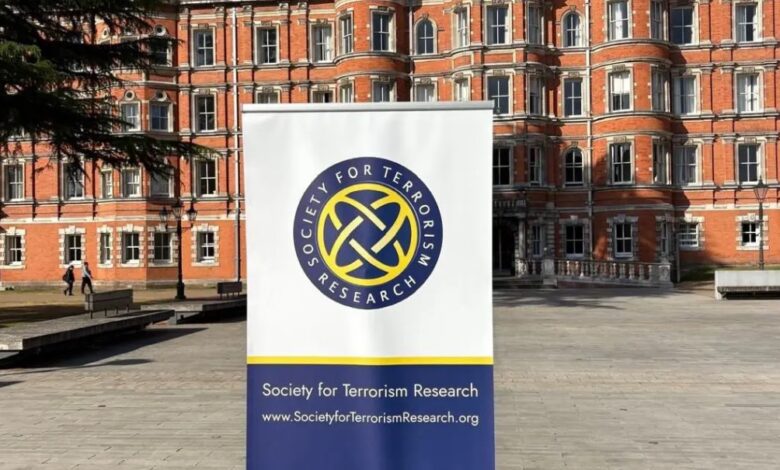Royal Holloway School of Law and Social Sciences Hosts International Terrorism Conference
Association for Defending Victims of Terrorism – Around 130 terrorism experts gathered at the 17th annual conference of the International Society for the Study of Terrorism (STR), hosted by Royal Holloway School of Law and Social Sciences, University of London and the Conflict, Violence and Terrorism Research Centre (CVTRC) in Egham, on the 20th anniversary of the 7th of July, according to the Royal Holloway website.

The event was organised by Elizabeth Pearson, Eva Chachavisiot and Ekil Avan (History), according to the report. The annual conference of the International Society for the Study of Terrorism is hosted by a different university each year. The conference was held on the 20th anniversary of the 7th of July London bombings, in which 52 people died in a series of coordinated suicide attacks.
Neil Basu, former Deputy Commissioner of the Metropolitan Police, who was also the UK’s national counter-terrorism lead for six years, spoke about the rising trend of youth radicalisation – particularly in the UK – in his speech, entitled “Protect Yourself – Lessons from Counter-Terrorism”. He highlighted the role of social media, misogyny and the isolating effects of the Covid-19 pandemic as key accelerating factors. Drawing on years of experience in counter-terrorism policing, Basu outlined a whole-of-society response to terrorism: one based on education, trust-building and community engagement, rather than relying solely on law enforcement. He argued that cohesion and resilience must be built from within. A key part of this, he said, was the prevention strategy, a controversial community-based approach to radicalisation. Another key theme was how not only to prevent terrorism, but also to rehabilitate terrorists. In the panel on Extremism, De-Extremism and Rehabilitation, several presenters offered new perspectives on transformative change. Dr Jonathan Kurzoli of the Frankfurt Institute for Peace Research explored the psychological mechanisms of induced hypocrisy – how cognitive dissonance, when skillfully evoked, can create grounds for ideological reflection. Andrea Hall of Her Majesty’s Prisons and Probation Service (HMPPS) introduced the Healthy Identity Intervention Model for Change, a novel programme designed to help individuals rebuild a resilient sense of identity. Although these topics were presented independently, the discussions that followed highlighted common principles between the two approaches, particularly on how psychological distress can be used to advance de-extremism.
Professor Andrew Silk, who teaches the psychology of terrorism, gave an overview of his ongoing research into just world beliefs – the idea that people get what they deserve – which appear to be disproportionately strong among terrorist perpetrators. These beliefs may reinforce ideological rigidity or support moral disengagement, and Silk’s findings open new avenues for understanding how worldviews shape violent behavior.
Another lecturer, Dr Anthony Richards, then looked at the semantics of terrorism itself. His presentation stressed the need to separate ideological goals from operational methods when defining extremism. Richards offered a revised framework – one that distinguishes radical ideas from practical intent that causes harm – that would allow for more nuanced legal and operational responses.
In the Risk Assessment Panel, Margarida Damas from Innovative Prison Systems focused on newly released individuals as being particularly vulnerable to radicalisation due to the insecure environments they face upon release. She highlighted the use of tools such as the TVRAT for risk assessment. Rizka Antica from the University of Leeds shared research on ISIS returnees which showed that deportees are often at greater risk than voluntary returnees. The latter group are often ideologically disintegrated before returning, while deportees may retain more extreme views due to their lack of personal agency in returning. The conference concluded with a keynote address by Professor Charlotte Heath-Kelly, from the University of Warwick. She explored the evolution of memorial practices since 9/11. Moving away from institutional and state-based memorials, contemporary memorial practices have become increasingly personal, decentralised and digital. Heath-Kelly provided a timely reminder of how memory lives and adapts – both online and in the collective consciousness – and how it continues to shape our societal response to terrorism.
Over two days of lively exchange, the conference provided a vital space to address contemporary challenges, reflect on past lessons and shape future policies.
Key themes that emerged across the panels included:
The urgent need for clearer and more comprehensive training for all stakeholders, including professionals, law enforcement and the general public
The need to prioritise public safety and countering extremism over commercial interests, with greater collaboration between public and private sector actors
The evolving threat landscape in the digital realm, where artificial intelligence technologies, online communities and the spread of misinformation are creating new risks.





